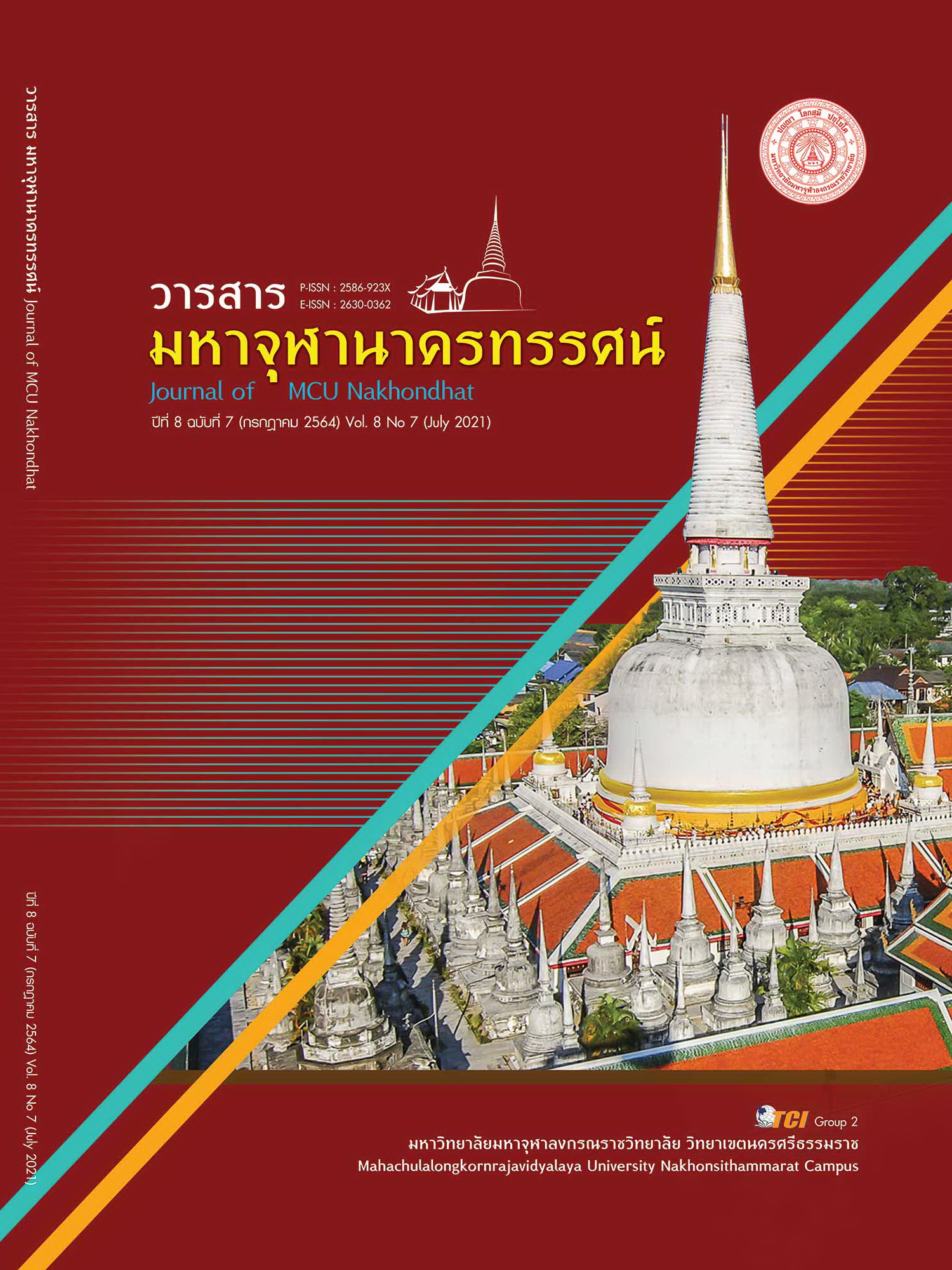CREATION OF HUMAN INTELLECTUAL CAPITAL AND THE DEVELOPMENT OF AI IN THE ERA OF THAILAND 5.0
Main Article Content
Abstract
This article has an objective to study the creation of intellectual human capital and the development of AI in the era of Thailand 5.0, in which intellectual human capital is related to knowledge, ability, experience, specialized skills. Creative It is important to create value for an organization no less than financial capital and assets. Therefore, the organization must focus on the creation of human capital, structural capital, and social capital. Society today is Thailand 5.0, that is, it is an era that combines the cyber world and the real world. With technology and AI as the basis for driving To create a seamless experience and a digital age where everyone has equal human dignity. Transfer and use of data are faster. Cognitive part Buddhist method of human resource development with the principle of Sikkha 3, namely, meditation and wisdom in order to live on the basis of negligence Focus on training the body, speech, mind and intelligence to be ready to perform their duties. With development that starts from the body and words to create peace Ready for the development of the mind With a strong determination and help to promote intelligence to work independently, able to enable people to develop integrated. And make human beings a balanced development in this AI is a machine with functions that have the ability to understand, learn, knowledge such as perception, learning, reasoning, problem solving. Various which must have ethics, consciousness is the conductor, is artificial intelligence Because in this digital age, just intelligence is not enough. Must be artificial intelligence To be a tool for creating world peace
Article Details
References
ดนัย เทียนพุฒ. (2553). ทุนมนุษย์จัดการให้ดีสู่ดีเลิศ. กรุงเทพมหานคร: โครงการฮิวแมนแคปปิตอล.
ทวีวัฒน์ ปุณฑริกวิวัฒน์. (2545). พุทธศาสนากับสังคมไทยปัจจุบัน. กรุงเทพมหานคร: วิถีทัศน์.
นิสดารก์ เวชยานนท์. (2551). มิติใหม่ในการบริหารทุนมนุษย์. กรุงเทพมหานคร: บริษัท กราฟิโก ซิสเต็มส์ จำกัด.
บุญมี แท่นแก้ว. (2539). จริยศาสตร์. กรุงเทพมหานคร: โอเดียนสโตร์.
พระธรรมโกศาจารย์ (ประยูร ธมฺมจิตโต). (2549). พุทธวิธีการพัฒนา. กรุงเทพมหานคร: โรงพิมพ์มหาจุฬาลงกรณราชวิทยาลัย.
พระธรรมปิฎก (ป.อ.ปยุตฺโต). (2543). จะพัฒนาคนกันได้อย่างไร. (พิมพ์ครั้งที่ 7). กรุงเทพมหานคร: สุขภาพใจ.
พระพรหมคุณาภรณ์ (ป.อ.ปยุตฺโต). (2555). พุทธธรรมฉบับปรับขยายภาคที่ 2. (พิมพ์ครั้งที่ 32). กรุงเทพมหานคร: สำนักพิมพ์ผลิธัมม์.
พระมหาสุทิตย์ อาภากโร. (2559). เอกสารคำสอนพระพุทธศาสนากับการพัฒนาสังคม. (พิมพ์ครั้งที่ 2). กรุงเทพมหานคร: โรงพิมพ์มหาจุฬาลงกรณราชวิทยาลัย.
พระราชวรมุนี (ประยุทธ์ ปยุตฺโต). (2528). พจนานุกรมพุทธศาสตร์ ฉบับประมวลธรรม. กรุงเทพมหานคร: มหาวิทยาลัยมหาจุฬาลงกรณราชวิทยาลัย.
พระสุธีรัตนบัณฑิต และคณะ. (2560). แนวคิดและกระบวนการทางสังคม. กรุงเทพมหานคร: บริษัทดีไชน์ ดีท์ไลท์.
มหาจุฬาลงกรณราชวิทยาลัย. (2539). พระไตรปิฎกภาษาไทย ฉบับมหาจุฬาลงกรราชวิทยาลัย. กรุงเทพมหานคร: โรงพิมพ์มหาจุฬาลงกรราชวิทยาลัย.
วันชัย สุขตาม. (2555). การพัฒนาทุนมนุษย์วิถีพุทธในยุคโลกาภิวัตน์. ใน วิทยานิพนธ์รัฐประศาสนศาสตรดุษฎีบัณฑิต สาขารัฐประศาสนศาสตร์. มหาวิทยาลัยราชภัฏวไลยลงกรณ์ ในพระบรมราชูปถัมภ์.
สมเด็จพระญาณสังวร สมเด็จพระสังฆราช (สุวัฒนมหาเถร). (2551). หลักการศึกษาของพระพุทธเจ้า. (พิมพ์ครั้งที่ 2). กรุงเทพมหานคร: มหามกุฏราชวิทยาลัย.
สมาคมโปรแกรมเมอร์ไทย. (2564). AI Artificial Intelligence ปัญญาประดิษฐ์. เรียกใช้เมื่อ 5 เมษายน 2564 จาก http://www.ai.krusudruadee.com/article.html
Burud, S. & Timobo. (2004). Inveraging the New Human Capital. CA: Consulting: Psychologists Press.
Edvinsson, L. & Malone, M. S. (1997). Intellectual capital: Realizing your company’s true value by finding its hidden brainpower. New York: Harper-Collins Publishers.
Kay, L. S. & Marian E. K. (1991). Form of Writing: A Brief Guide and Hand book. Ontario: Prentice-Hall Canada.
Thomas A. S. (1997). Intellectual Capital. New York: Doubleday.


